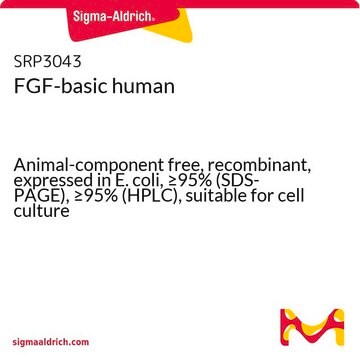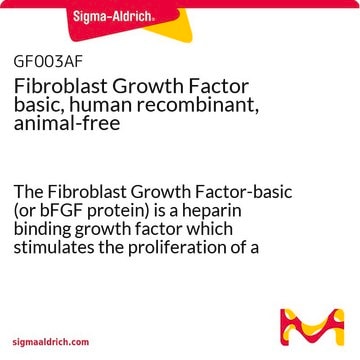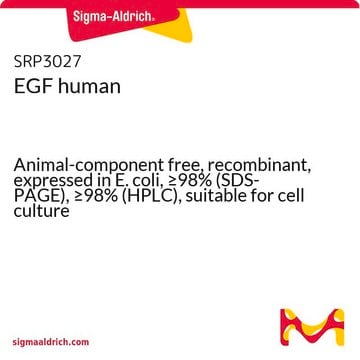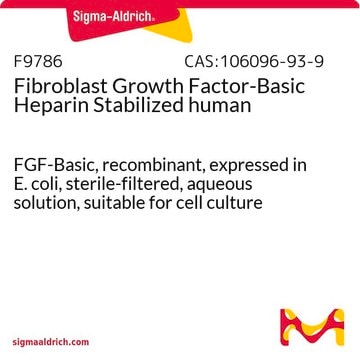F3685
Fibroblast Growth Factor-Basic
FGF-Basic, from human, recombinant, expressed in E. coli, carrier free
Synonym(s):
FGB-b, FGF-2, HBGF-2, HBGH-2, Prostatropin, bFGF
About This Item
Recommended Products
biological source
human
Quality Level
recombinant
expressed in E. coli
Assay
≥97% (SDS-PAGE)
form
lyophilized powder
potency
<1 ng/mL Biological Activity EC50
mol wt
16.0 kDa
packaging
pkg of 4X25 μg
pkg of 25 μg
storage condition
avoid repeated freeze/thaw cycles
color
white to faint yellow cast
solubility
water: soluble 0.025 mg, clear, colorless to faintly yellow
UniProt accession no.
storage temp.
−20°C
Gene Information
human ... FGF2(2247)
Related Categories
General description
Citation
2. Gospodarowicz, D. et al., Structural characterization and biological functions of fibroblast growth factor. Endo. Rev., 8, 95-114 (1987).
3. Esch, F. et al., Primary structure of bovine pituitary basic fibroblast growth factor (FGF) and comparison with the amino-terminal sequence of bovine brain acidic FGF. Proc. Natl. Acad. Sci. USA, 82, 6507-6511 (1985).
4. Neufeld, G., and Gospodarowicz, D., Basic and acidic fibroblast growth factors interact with the same cell surface receptors. J. Biol. Chem., 261, 5631-5637 (1986).
5. Lobb, R.R. et al., Purification of heparin-binding growth factors. Anal. Biochem., 154, 1-14 (1986).
6. Abraham, J.A., Human basic fibroblast growth factor: nucleotide sequence and genomic organization. EMBO J., 5, 2523- 2528 (1986).
Storage Class Code
10 - Combustible liquids
WGK
WGK 1
Flash Point(F)
Not applicable
Flash Point(C)
Not applicable
Certificates of Analysis (COA)
Search for Certificates of Analysis (COA) by entering the products Lot/Batch Number. Lot and Batch Numbers can be found on a product’s label following the words ‘Lot’ or ‘Batch’.
Already Own This Product?
Find documentation for the products that you have recently purchased in the Document Library.
Customers Also Viewed
Our team of scientists has experience in all areas of research including Life Science, Material Science, Chemical Synthesis, Chromatography, Analytical and many others.
Contact Technical Service








